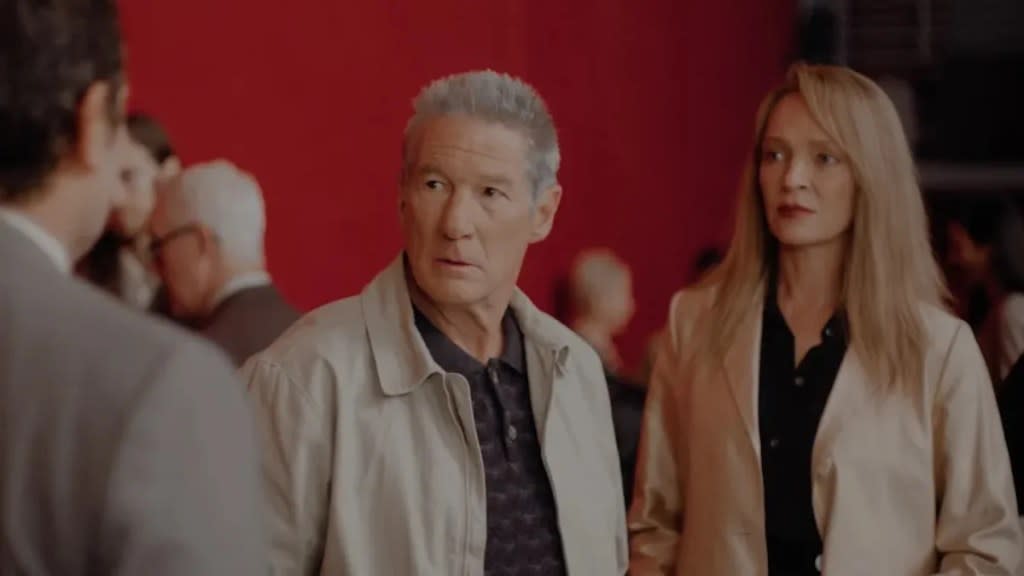‘Oh, Canada’ Review: Paul Schrader Gets the Better of Himself in Richard Gere Reunion

- Oops!Something went wrong.Please try again later.
- Oops!Something went wrong.Please try again later.
- Oops!Something went wrong.Please try again later.
Forty-four years on from the release of “American Gigolo,” Paul Schrader has written and directed another film that stars Richard Gere — and its title, “Oh, Canada,” makes it sound a bit like a sequel.
Certainly, Schrader seems intent on shocking the viewer with a blunt reminder of how much time has passed since 1980. The first shot of Gere is a close-up of a mottled, unshaven invalid with thinning white hair. It turns out that his character was something of a seducer in his day — but that day was long ago.
The character in question is Leo Fife, a feted real-life documentary filmmaker who here is stricken by terminal cancer, so he agrees to be the subject of a documentary himself. A husband-and-wife team of his former students (Michael Imperioli and Victoria Hill) have come to interview him in his grand Montreal home, and his only condition is that his wife Emma (Uma Thurman), another former student, should be present to witness what he promises will be something of a deathbed confession.
Interview underway, an extended flashback offers some hints of what that confession might be. It’s 1968, and Leo is an aspiring writer in his early 20s played by Jacob Elordi, who’s certainly handsome enough for the job, and he delivers a dead-on Gere impersonation, even if it’s tricky to believe that the character has shrunk by a foot in height over the intervening years.
Anyway, Leo is married with a baby son at this point. He is about to fly from his in-laws’ home in Richmond, Virginia, to begin a teaching job at a college in Vermont when his father-in-law invites him into the billiard room for cigars, Scotch and a potentially life-changing proposal. This moneyed southern family would like Leo to take over as the CEO of its pharmaceutical company. He could carry on with his writing, they insist. He’d just be rich while he was doing it.
It’s an intriguing dilemma, in a rarefied sort of way, and Schrader presents it with a theatrical flourish. In one scene, Elordi is replaced by Gere, although a younger and healthier Gere than the one in the framing scenes. But the dilemma is soon shoved aside as “Oh, Canada” hops between numerous episodes in Leo’s life, sometimes in color, sometimes in black and white, and sometimes flashbacks nested within flashbacks.
He is seen meeting romantic partners who are characterized in the vaguest of terms: “Amanda was a jazz pianist.” He is seen hosting screenings of his documentaries and seminars on the meaning of photography. He visits his home town, he argues with his parents about his education — and so on and on until only the most avid observer of Elordi’s hairstyles will be able to recall when each episode is supposed to take place. Back in the present day, Gere appears to be straining as hard as he can to show how Leo is frustrated by his illness and racked by the guilt that so often besets Schrader’s heroes, but the over-complicated, fragmentary structure saps the power and anger that was there so recently in “First Reformed,” “The Card Counter” and “Master Gardener.” This is Schrader in fanciful, daydreaming mode, and it’s not a mode that suits him.
To be fair, much of the film’s clutter and confusion is a deliberate evocation of Leo’s own befuddlement, as brought on by his medication. But much of it is the result of Schrader’s being too experimental for his own good. Having set up the device of Leo’s delivering his reminiscences to camera, it’s perplexing that the voiceover sometimes represents his internal monologue instead. It’s even more perplexing when Leo’s grown-up son takes over the narration.
“Oh, Canada” is adapted from “Foregone,” a novel by Russell Banks (the writer of “Affliction,” which was also filmed by Schrader), and it leaves the viewer with the strong suspicion that Schrader struggled in vain to fit all of the key parts of the book into his film.
Early on, for instance, it’s established that Leo has abandoned at least one wife and child and possibly two or three (I lost track) — surely the kind of juicy revelation that would turn a respectable documentary into a headline-grabbing, award-winning hit. But neither the documentary-makers nor Schrader seems interested in following up on this bombshell. Similarly, there is a story somewhere, between all the scrappy snippets, of a man who moves to Canada to avoid the Vietnam War draft, but this choice has too little prominence to have any emotional impact.
Rather than delve into the ethics of Leo’s decisions, Schrader would rather stick in a section in which the young man discusses the marital woes of a painter he knew at college, and then the painter’s wife comes in — and she’s played by Thurman, too. Oh, Paul.
The main conclusion to be drawn from this sincere but stupefying head-scratcher is that the interview recorded by Leo’s former students would have ended up as a terrible documentary. Schrader’s own film isn’t much better.
The post ‘Oh, Canada’ Review: Paul Schrader Gets the Better of Himself in Richard Gere Reunion appeared first on TheWrap.

